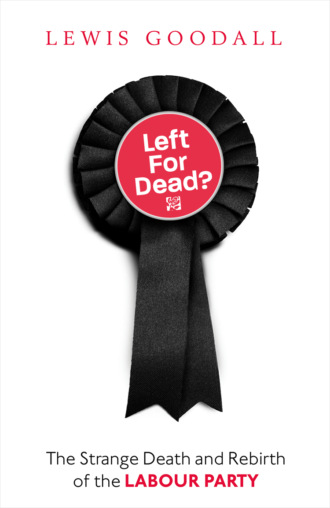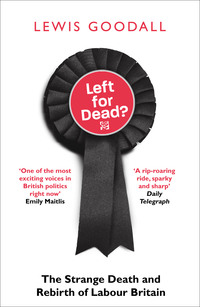
Полная версия
Left for Dead?: The Strange Death and Rebirth of the Labour Party
Yet it’s more than that; I was born into a working-class Labour family but doing the thing that they wanted most of all – getting educated, moving away, going to Oxford, leaving the familiar and making anew. In doing so, in lots of ways, I feel removed from my family and our old way of life, in which I was happy. But on the other, I don’t entirely feel at home with the new world that has taken its stead, nor with the new Labour Party that has been created which looks, feels and sounds so much like the new rarefied world I’ve entered. Perhaps then, as a journalist, I’m in the right place, not as I used to think as a politically obsessed kid as a participant in the arena, but as a passionate observer.
In the interest of full disclosure, I should say at the outset that I joined the Labour Party when I was 15 years old, as soon as I was able. There’s no point in not being up front about that. I was a very political young man – I still am. For me, as a 15-year-old, I felt my sense of class very deeply. Labour was for kids like me and families like mine. It was the simplest and most basic lesson of politics. I wanted to change my life and that of those around me and joining Labour, my eyes dazzled by the New Labour politics of the age, seemed natural. I sat in dusty leisure centres and school halls on Thursday evenings, debating motions and resolutions, and gave up my teenage Sundays to leaflet in the drizzle. It felt right. Today – with the bonds between Labour and the sort of kid I was frayed – I don’t know whether the 15-year-old me, now, would do the same. This is why I tell you this. Certainly, as a reader you deserve that honesty. You might argue that such history (and such openness) is incompatible with my job as a political correspondent. I would emphatically reject that. I have long left any party affiliation behind me. Every political journalist has a past and often a political one – indeed, given our borderline obsession with all things politics, it would be peculiar if we didn’t. Other journalists’ past (or present) political predilections are well known. But straightforwardness is not the only reason. Most importantly, I talk of my past here because it is directly relevant to the story I propose to tell. I was born into the automatic Labourism of my class and birth. As I have changed, moved on and grown up, so in a peculiar way has Labour. These pages tell the story of the evolution of the party I knew. I hope to tell the story of that evolution as fairly and dispassionately as I can. But it is nonetheless also a personal one.
The only living remains of the Rover factory today is the Austin Social Club, where I spent so many of those childhood Christmas Eves and my dad a fair bit of his wage. It’s a lingering remnant of what was: a workers’ club for a workplace long gone.
Around the new precinct, through the rapidly descending December fog, I noticed what appeared to be two road signs outside the shops. On closer inspection, I could see they weren’t road signs but instead each carried a phrase. They stopped me dead: on the left ‘WE SLEPT TO THE SOUND OF HAMMERS’ and on the right ‘IT WASN’T ABOUT CARS, IT WAS ABOUT PEOPLE’. Many of my friends find the notion of working in industry almost quaint. To us, it wasn’t just a way of life, it was a reason to be. It was under those hammers, and those like them up and down the country, that the Labour movement was forged. And now they’ve ceased to sound, the old movement has withered. But out of its shed skin something else has emerged, something new. It feels, with the 2017 general election result, that the new is half-formed. The old is not quite dead. But its new party is not yet quite born. Perhaps, like me, Labour is betwixt and between two worlds.
* He survived through a combination of Grandad’s munificence and a bit of light form-fiddling.
† I didn’t know it, but looking back, I’d stumbled upon Keynesian economics without realising.
Конец ознакомительного фрагмента.
Текст предоставлен ООО «ЛитРес».
Прочитайте эту книгу целиком, купив полную легальную версию на ЛитРес.
Безопасно оплатить книгу можно банковской картой Visa, MasterCard, Maestro, со счета мобильного телефона, с платежного терминала, в салоне МТС или Связной, через PayPal, WebMoney, Яндекс.Деньги, QIWI Кошелек, бонусными картами или другим удобным Вам способом.



